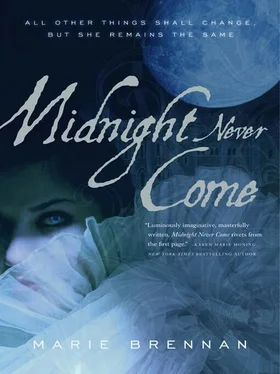— Baldesar Castiglione
The Courtyer
The chamber is a small one, and unfurnished; whatever lay here once, no one claims it now. There are rooms such as these in the Onyx Hall, forgotten corners, left vacant when their owners died or fled or fell from favor.
For him, they feel like home: they are neglected, just as he is.
He came in by the door, but now he cannot find it again. Instead he wanders to and fro, from one wall to another, feeling the stone blindly, as if the black marble will tell him which way to go, to be free.
One hand touches the wall and flinches back. He peers at the surface, leaning this way and that, as a man might study himself in a mirror. He stares for a long moment, then blanches and turns away. “No. I will not look.”
But he will look; there is no escape from his own thoughts. The far wall now draws his eye. He crosses to it, hesitant in his steps, and reaches out until his fingers brush the stone, tracing the image he sees.
A face, like and unlike his own. A second figure, like and unlike her. He spins about, but she is not there with him. Only her likeness. Only in his mind.
Against his will, he turns back, wanting and not wanting to see.
Then he is tearing at the stone, pulling at the mirror he imagines until it comes crashing down, but that brings him no respite. All about him he sees mirrors, covering every wall, standing free on the floor, each one showing a different reflection.
A world in which he is happy. A world in which he is dead. A world in which he never came among the fae, never renounced his mortal life to dwell with immortal beings.
A world in which…
He screams and lashes out. Blood flowers from his fist; the silvered glass is imaginary, but it hurts him just the same. Beyond that one lies another, and soon he is lurching across the room, breaking the mirrors, casting them down, pounding at them until they fall in crimson fragments to the floor. His hands strike stone, again and again, lacerating his flesh, cracking his delicate bones.
Until he no longer has the will to fight, and sinks into a crouch in the center of the chamber, mangled fingers buried deep in his hair.
All around him, the pieces of his mind reflect a thousand broken other lives.
He could see much, if he looked into them. But he no longer has the will for that, either.
“There are no other lives,” he whispers, trying to make himself believe it, against all the evidence of his eyes. “What is over and done cannot be redone. ’Tis writ in stone, and will not fade.”
His bleeding hands drift downward and begin to write strange, illegible hieroglyphs upon the floor. He must record it. The truth of how it went. Else those who come after will be lost in the maze of mirrors and reflections, never knowing reality from lies.
It will not matter to them. But it matters to him, who tried for so long to tell the truth of the futures he saw. That gift has turned traitor to him, bringing nothing more than pain and despair, and so he takes refuge in the past, writing it out amidst the shattered pieces of a hundred might-have-beens.
HAMPTON COURT PALACE, RICHMOND: January 6, 1590
The winter air carried a crisp edge the sunlight did little to blunt, but for once there was hardly more than a breeze off the Thames, scarcely enough to stir the edge of Deven’s cloak as he hurried through the Privy Garden. He passed bare flowerbeds protected beneath layers of straw, squinting at the brightness. He had been assigned to serve the Queen at supper for the Twelfth Night feast, but that duty hardly precluded one from participating in the merriment. Deven had no idea how many cups of hippocras he had downed, but it felt like a dozen too many.
Nor was he the only one who had overindulged, but that was to his advantage. Deven had not risen at this ungodly hour without reason. With so many courtiers and the Queen herself still abed, he could snatch a few moments for himself, away from prying eyes — and so could the one he was hurrying to meet.
She was waiting for him in the Mount Garden, standing in the lee of the banqueting house, well-muffled in a fur-trimmed cloak and gloves. The hood fell back as Deven reached for her face, and lips met cold lips in a kiss that quickly warmed them both.
When they broke apart, Anne Montrose said, a trifle breathlessly, “I have been waiting for some time.”
“I hope you are not too cold,” Deven said, chafing one slender hand between his own. “Too much hippocras, I fear.”
“Of course, blame the wine,” she said archly, but smiled as she did so.
“’Tis a thief of men’s wits, and of their ability to wake.” Frost glittered on the ground and the bare branches of trees like ten thousand minuscule diamonds, forming a brilliant setting for the gem that was Anne Montrose. With her hood fallen back, her unbound hair shone palest gold in the sun, and her wide eyes, a changeable gray, would not have looked out of place on the Queen of Winter that featured prominently in last night’s masque. She was not the greatest beauty at court, but that mattered little to him. Deven offered her his arm. “Shall we walk?”
They strolled sedately through the hibernating gardens, warming themselves with the exercise. It was not forbidden for them to be seen together; Anne was the daughter of a gentleman, and fit company for him. There were, however, difficulties. “Have you spoken to your mistress?” Deven asked.
He was hesitant to broach the topic, which might ruin the glittering peace of this morning. It had weighed heavy upon him, though, since he first voiced it to Anne, some months prior. The increased duties of winter court and the never-ending ceremonies of the Christmas season had prevented them from doing more than exchange brief greetings whenever they passed, and now he fretted with impatience, wanting an answer.
Anne sighed, her breath pluming out in a cloud. “I have, and she has promised to do what she may. ’Tis difficult, though. The Queen does not like for her courtiers to marry.”
“I know.” Deven grimaced. “When Scudamore’s wife asked permission, the Queen beat her so badly she broke Lady Scudamore’s finger.”
“I am glad I do not serve her, ” Anne said darkly. “The stories I hear of her temper are dreadful. But I am not the one who will bear the brunt of her wrath; she cares little what a gentlewoman in service to the Countess of Warwick does. You, on the other hand… ”
Marriage is no scandal, his father had said, when he went into service at court, over a year ago. Get thee a wife, his fellows in the band had said. It was the way of the world, for men and women to marry — but not the way of the Queen. She remained virginal and alone, and so would she prefer her courtiers to be.
“She is envious,” Anne said, as if she had heard that thought. “There is no love in her life, and so there should be none in the lives of those who surround her — save love for her, of course.”
It was true as far as it went, but also unfair. “She has had love. I do not credit the more sordid rumors about her and the late Earl of Leicester, but of a certainty she was fond of him. As they say she was of Alençon.”
“Her froggish French prince. That was politics, nothing more.”
“What would you know of it?” Deven said, amused. “You could not have been more than ten when he came to England.”
“Do you think the ladies of court have ceased to gossip about it? Some say it was genuine affection, but my lady of Warwick says not. Or rather, she says that any affection the Queen may have felt was held in check by her awareness of politics. He was, after all, Catholic.” Anne reflected on this. “I think it was desperation. Mary was old when she married; Elizabeth would have been older, in her forties. It was her last chance. And, having lost it, she now vents her frustration on those around her who might find happiness with another.”
Читать дальше












